We Burned The Forest Down: 'The Dark Knight' 10 Years Later
(Welcome to The Dark Knight Legacy, a series of articles that explore Christopher Nolan's superhero masterpiece in celebration of its 10th anniversary.)This week, The Dark Knight turns 10 years old. Its legacy still looms large, for better and worse. Here is the story of how Christopher Nolan changed the face of superhero movies forever. The story of how one movie proved that comic book adaptations could be a lot more than kids stuff. And the story of how some of it backfired, giving birth to a new era of fandom that just wanted to watch the world burn.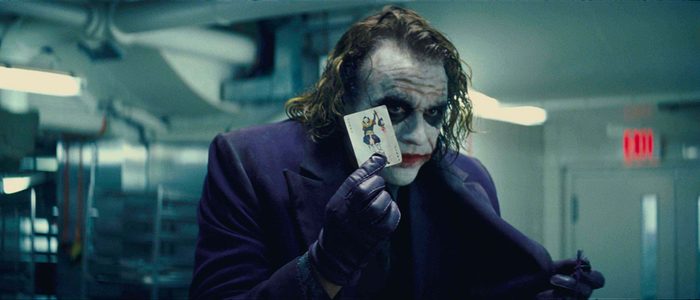
Why So Serious?
Summer, 2008. The hype for Christopher Nolan's The Dark Knight was at a fever-pitch. The early release of a prologue scene, coupled with fantastic trailers, had caught the attention of seemingly everyone – bat-fan and non-bat-fan alike. The tragic death of co-star Heath Ledger had only increased the anticipation for the film. The actor was generating buzz for his portrayal as the Joker before his passing in January of that year, and after Ledger's demise, rumors began circulating that he had taken the role of the Joker so seriously that it had ultimately destroyed him. These rumors were rubbish –friends and family (not to mention the crew of The Dark Knight) would go on record numerous times stating that Ledger was having an absolute blast playing the Clown Prince of Crime. But the legend stuck – even after the debunking, some still thought that maybe, just maybe, the Joker was the role that killed Heath Ledger. And that only increased the excitement to see the film.The early reviews started pouring in. They were immediately, and overwhelmingly, positive. Rolling Stone, Entertainment Weekly and Time all raved. Roger Ebert wrote: "Batman isn't a comic book anymore. Christopher Nolan's The Dark Knight is a haunted film that leaps beyond its origins and becomes an engrossing tragedy. It creates characters we come to care about. That's because of the performances, because of the direction, because of the writing, and because of the superlative technical quality of the entire production. This film...redefine[s] the possibilities of the 'comic-book movie.'"Fans were ecstatic.And then it all started to go wrong. At least, in the eyes of some. While the end-tally of reviews for The Dark Knight would make it one of the best-reviewed comic book movie of all time, there were some outliers. David Fear gave the film a less-than-positive review in Time Out New York. Ditto David Denby in The New Yorker. And the outrage in the fan community turned toxic – so much so that Denby ended up receiving death threats on Rotten Tomatoes.What was happening here? The Dark Knight didn't give birth to toxic fandom. There have always been a subset of hardcore fans who take their respective fandoms very, very seriously. Even within the world of Batman, toxic fandom had flourished before Nolan's 2008 blockbuster. But usually such angry diatribes were directed at the makers of the films, not the critics. Joel Schumacher was practically burned in effigy after he turned Tim Burton's dark and moody bat-series into a neon-drenched carnival. And even Nolan was not above reproach – when it was announced the filmmaker had cast Ledger as the Joker, several fans practically lost their minds. The general (and, let's face it, homophobic) consensus at the time of Ledger's casting seemed to be: "How could Nolan cast the guy from the gay cowboy movie as the Joker?"But the ire and rage boiling over upon release wasn't directed at Nolan. It was directed at the few critics who dared to say that The Dark Knight was less-than-perfect. It was the beginning of a strange new trend in superhero fandom – anyone who gave a comic book property a bad review was a "hater." Never mind the fact that most of the people angrily reacting to said negative reviews hadn't seen the film in question yet. The simple fact was this: a subset of the fandom not just wanted, but needed, legitimacy to be brought to the genre. After Schumacher's goofball Batman Forever and Batman and Robin, there was a burning desire among bat-fandom to prove that Batman wasn't kids stuff. It wasn't fun and lighthearted – it was dark and serious. And more than that, it was legitimate. It wasn't a comic book movie. It was a movie, plain and simple. That's what so many fans were aching for, and any critic who dare say otherwise was, in their warped vision, an enemy of the people.It was a trend that would only continue, and grow. So much so that when The Dark Knight Rises arrived in 2012, Rotten Tomatoes actually had to close down their comments section for the film to stop the death threats against critics giving the film anything other than a 100% positive review. Not even a mixed-to-positive review would do. You had to say the film was perfect, or else you were a hater.Ultimately, this is a tragedy. Because The Dark Knight is a truly groundbreaking work. A film of immense technical skill, filled with engrossing storytelling, and featuring remarkable performances. But the toxicity has tarnished its legacy. I can freely admit that I think The Dark Knight is a borderline masterpiece. And yet when I admit this, I also cringe ever-so-slightly. Because I can't help but think that saying such a thing lumps me in with the type of over-the-top wackos who sent out death-threats to anyone who dared to criticize what Nolan had made.But I come here to praise The Dark Knight, not to bury it. 10 years later, The Dark Knight remains just as haunting as it was when it hit theaters in 2008. Perhaps moreso. Because in the end, Nolan's film actually believes in hope. Believes that people will ultimately do the right thing. And I'm not sure that's true anymore. I'm not sure it was true then, either. But perhaps I was naive enough to think it was. "When the chips are down," Ledger's Joker sneers, "these civilized people...they'll eat each other." In the end, the good people of Gotham prove that this isn't the case. Here, 10 years later, I'm starting to think that maybe it is.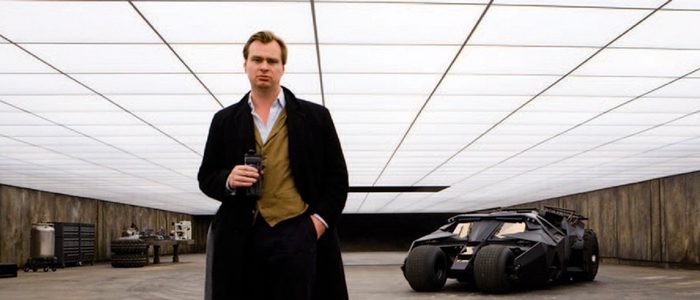
Aggressive Expansion
The Batman franchise was in a strange place in the 21st century. After the disaster that was Batman and Robin, director Joel Schumacher wanted a chance at redemption. He pitched Warner Bros. a reboot – an adaptation of Frank Miller and David Mazzucchelli's comic Batman: Year One. Warners didn't go for it. At least, not from Schumacher. A few years later, the studio would flirt with the idea of allowing director Darren Aronofsky to bring Year One to the big screen, but it ultimately didn't work out. Finally, Warner Bros. hired Christopher Nolan to reboot their franchise.Nolan was an unlikely candidate. He had launched his film career with the little-seen thriller Following. The film that put him on the map was Memento, a twisty, clever indie that unfolds in reverse. After that came a remake of Insomnia. None of these films screamed "the next Batman director!" But Nolan landed the gig nonetheless, and he set about making a bat-film unlike any before it.Nolan's 2005 Batman Begins borrowed elements of Year One, but also forged its own path. It was a psychological thriller that just happened to be a superhero film. For the first time in film history, a filmmaker wasn't telling the story of Batman – he was telling the story of Bruce Wayne. Wayne (Christian Bale) doesn't don his famous cape and cowl till nearly halfway through the movie. The bulk of the narrative is about how Wayne became Batman, and how he returned to his corrupt city of Gotham with the hopes of cleaning things up. As the film ends, Nolan drops a tantalizing teaser: Jim Gordon (Gary Oldman), not yet a commissioner, tells Batman about a criminal with a "taste for the theatrical." A criminal who leaves a calling card at the scenes of his crimes – a joker card. "I'll look into it," Christian Bale's Batman growls before turning and flying right into the camera. It's thrilling as hell, but it wasn't exactly a deliberate sequel set-up."We wanted to suggest possibilities for how the story would continue," Nolan said, "not because we knew we were going to make a sequel, but because that was the feeling we wanted to audience to leave the theater with. The ending of Batman Begins was specifically aimed at spinning off that element of the mythology in the audience's mind so that they could imagine what they Joker would be in that world."Nolan may not have been planning a sequel at the time, but a sequel would happen – after the director went off and made the dueling magicians film The Prestige. That sequel would be The Dark Knight, and it would open up Nolan's Bat-world in surprising, thrilling ways.Right from the start, Nolan's approach to Batman had been to find ways to make the character grounded. What would happen, Nolan's Batman Begins asks, if Bruce Wayne was a real person, in the real world? The director, working with writer David S. Goyer, did away with comic book fancies and crafted something set in a somewhat realistic world. Or at least, as realistic as a movie about a man in a bat costume fighting a guy dressed as a scarecrow could be.For The Dark Knight, Nolan would take his thirst for realism to a whole new level. For all its real-world, gritty trappings, Batman Begins still feels like a comic book movie. The Dark Knight is something different. Working with brother Jonathan Nolan, Nolan ended up crafting a crime thriller loaded with allegories to the so-called "war on terror." This film just happened to feature Batman, the Joker and Two-Face.The idea behind The Dark Knight was escalation. If Batman existed in the real world – as Begins suggested – how would the real world then react to Batman? The answer: it would inspire people to both emulate, and seek to destroy Batman. At the start of The Dark Knight, we learn an entire gang of dumpy, gun-toting idiots in Gotham City have begun dressing up just like Batman, trying to fight crime on their own. They think they're helping, but they're bound to get themselves killed.As for Gotham, the city is going through a time of change. Batman is a vigilante, so the Gotham police department is technically supposed to arrest him. But Lieutenant Jim Gordon has a friendship with the so-called Batman, and the cops are (mostly) perfectly fine with some random man taking justice into his own hands. Meanwhile, organized crime is running scared. In Begins, we see that Gotham is a city practically eroding from corruption. In The Dark Knight, Batman's crusade is beginning to put a serious dent in that corruption.And that's not the only dent. There's also new district attorney Harvey Dent (Aaron Eckhart), a Robert Kennedy-esque white knight. A man determined to do the right thing, and bring down the mob in legal ways, rather than just punching and terrifying them a la Batman. As Nolan would say later, the real protagonist of The Dark Knight isn't Batman – it's Harvey Dent. Eckhart excellently handles Dent's progression – he begins as a cocky, idealistic bastion of justice, and ends up a scarred, murderous monster. Harvey is the character with an actual arc in the film. Batman merely exists on the periphery. He never changes. In fact, part of the film's plot revolves around how unchanging Batman is. He lives by rules, and those rules ultimately hinder him. And the fact of the matter is, he really doesn't want to do this forever.Some fans have a big problem with this particular interpretation of the character. The Batman of the comics would never want to give up his crusade. The comic book Batman is all-consumed by his never-ending battle against crime. The Batman in Nolan's films, however, wants out. He wants to make a mark, do some good, and then hang up his cape and cowl. Primarily so he can settle down with childhood friend Rachel Dawes (Maggie Gyllenhaal, stepping in for Katie Holmes). That Rachel is in a happy relationship with Harvey doesn't seem to register with Bruce/Batman – in his warped mind, if he can stop being Batman, Rachel will want to be with him.But any progress Batman has made in the months since his arrival in Gotham is about to be blown to smithereens. Because there's an unstoppable force suddenly wreaking havoc in the city. A spectre smeared with runny grease-paint, and a carved-up grin.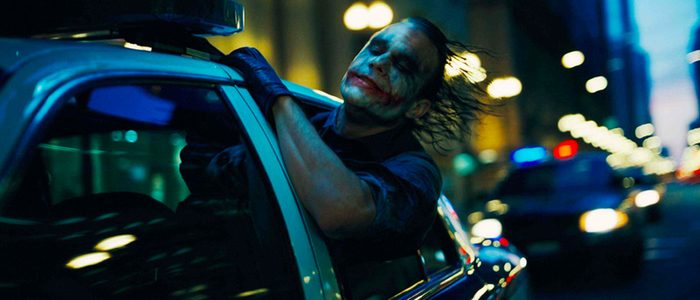
A Dog Chasing Cars
What more can be said about Heath Ledger's portrayal of the Joker? We have spent the last 10 years heralding this performance, and rightly so. When Ledger took the role, there was a sense he was embarking on a fool's errand. Jack Nicholson's scene-stealing turn as the Clown Prince of Crime in 1989's Batman was so iconic that it seemed almost insane for someone to attempt the part again.But Ledger defied the odds. His Joker is mesmerizing – a nuanced, haunting character that we can't take our eyes off of. Every mannerism, every tic, every word issues forth from Ledger hypnotically. We are enraptured. The Nolan brothers described their Joker as being like the shark from Jaws – a force of nature, so to speak. And that's exactly what Ledger is doing here. His Joker isn't human – he's a specter. We can easily imagine him materializing on the street corner we first see him on, like a ghost or a demon summoned up by some dark ritual.The Joker of the comics has gone through several incarnations – from quippy goofball to horror-movie monster. There's no "right" way to portray the character (although there's certainly a wrong way; i.e. Suicide Squad). Ledger's approach to the part draws on some comics, but the actor also brings a feral, wounded-animal quality to the character that stands out the most.His skin isn't bleached white, but rather smeared with runny, dripping clown makeup. His smile isn't painted on, but is instead a twisted scar – a scar the character can't stop licking at, in a disgusting, brilliant flourish that Ledger arrived at after finding an urge to lick at the prosthetics on his face. The actor adopts a nasally voice, as well as a Chicago accent – The Dark Knight was filmed in Chicago, and Ledger seemingly embraced this element in full-force. He limps and staggers through scenes, his dirty purple suit and greasy hair so instantly jarring and defined that we can almost smell a foul odor coming off him.Ledger's performance was so good, and so entertaining – when asked by a mob boss if he thinks he can steal all their money and simply walk away clean, Ledger improvised a curt and simple reply, "Yeah", that leaves me howling no matter how often I hear it – that many people seemed to completely misunderstand the character.That is to say, people liked the Joker. I don't mean they liked Ledger's performance, or they liked the brilliant way the script presents him. I mean they liked his motivations, and his actions. The Joker and his philosophy – "Some men want to watch the world burn," Michael Caine's Alfred says – became fully embraced by a troll-based culture that seemed to thrive on conflict and annoyance. The Joker is an absolute – he has no morals; no fears. "You have nothing!" he cackles at Batman in one scene. "Nothing to threaten me with! Nothing to do with all your strength!" The Joker isn't meant to be envied, or idolized. He's meant to be feared. He's meant to be loathed. He's a murderous lunatic – someone who gets off on carving people up. Someone who blows up a woman for a gag. He's a ghoulish, destructive force. And yet...people love him.Is such a reaction inevitable? When crafting a compelling, iconic, scene-stealing villain, is it a foregone conclusion that the audience will gravitate towards them more than the hero? And if so, what does that say about the audience? What does that say about us? Are we naturally inclined to root for the bad guy, if he's charismatic enough? How terrifying is that?Ledger's Joker has a plan: total anarchy. He's on a mission to prove that Gotham, and by extension, the world, is just as insane as he is. Through a series of increasingly deadly actions, he turns Gotham into his own personal lunatic asylum. Chaos reigns, and the character establishes an overly-complex scenario in which two ferry boats – one loaded with innocent civilians, one loaded with criminals – are forced to decide to blow each other up. One has to act before the other, or seek certain death. Nolan drags this out, presenting both sides struggling against survival instincts. Which boat will blow first?In the end, neither. The people of Gotham prove the Joker wrong. They're not as ugly as he is. It's a hopeful message, and it worked in 2008. But here, ten years later, it rings false. I can't help but think that here, in 2018, when presented with the same choice, one or both of those boats would explode almost instantly. And perhaps that's the most terrifying thing about Nolan and Ledger's Joker: he was ultimately right. "I'm not a monster," he says at one point. "I'm just ahead of the curve."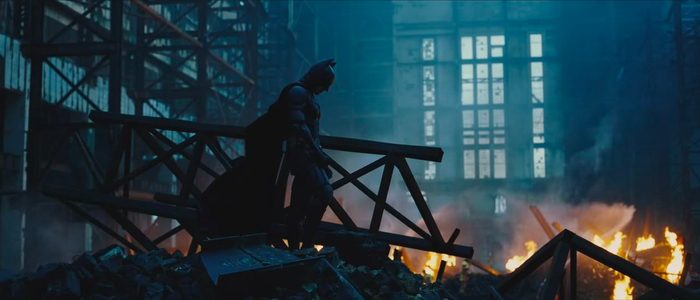
Introduce a Little Anarchy
Talking about the political connotations of The Dark Knight feels like wading into a quagmire. The film arrived in the final year of the presidency of George W. Bush – a presidency that gave us the so-called "War on Terror", while stripping away freedoms and privacy all in the name of national security. But which side of the coin did The Dark Knight fall?Some claimed the film was pro-Bush – that Batman's extreme decisions to fight the terrorist Joker echoed the decisions made by the Bush administration. Others, however, felt the film was speaking the opposite. That in the end, the message wasn't that extreme measures must triumph, but rather that goodness and honor will save the day. President Barack Obama has even cited the film in the past, comparing the Joker's rise to that of ISIS. "There's a scene in the beginning in which the gang leaders of Gotham are meeting...They were thugs, but there was a kind of order," the former POTUS said. "Everyone had his turf. And then the Joker comes in and lights the whole city on fire. ISIS is the Joker. It has the capacity to set the whole region on fire." The fact that any of these interpretations are even possible speaks to how unusually complex The Dark Knight is for a comic book movie.Ultimately, though, I think it's clear that Nolan was not falling on the side of the Bush doctrine. Batman is an inherently fascist character, yes – if you don't believe that, just remember Frank Miller has built an entire goddamn career hammering home this point – but Nolan's caped crusader is something more. And the Nolan brothers' script takes pains to underline which side of the divide they – and by extension, the story – stand on.In the film's climax, Batman reveals to gadget expert Lucius Fox (Morgan Freeman) that he's constructed a device that turns every cellphone in Gotham into his own personal security camera. He can hack into anyone and everyone in Gotham, and find out what they're up to."Beautiful, isn't it?" Batman says, like a total creep."Beautiful...unethical...dangerous," Fox says, adding. "This is wrong."In the end, Batman enables Fox the power to destroy the device – although it's worth noting he does use it first. And successfully, to boot.But the real proof that Nolan thinks pulling out all the stops to battle terror comes from a brilliantly delivered moment courtesy of Michael Caine. Everyone remembers Cain's famous "Some men just want to watch the world burn," speech, but it's the follow-up conversation to this moment that really lingers with me.In telling his "world burn" story, Caine's Alfred recounts a story about his youth, in which he was working for the local government in Burma trying to catch a bandit. The bandit wasn't stealing for profit; he was just stealing for the sake of stealing. And the bandit was hard to catch because he was hiding in the forst.Later in the film, Bruce Wayne is a broken man. He's failed to save Rachel, who has been killed by the Joker. And he's also failed to fully save Harvey, who has had half his face burned off in an explosion. After bemoaning his failures, Bruce asks Alfred: "The bandit, in the forest in Burma, did you catch him?""Yes," Alfred says quietly."How?" Bruce asks."We burned the forest down," Alfred says. Nolan immediately cuts here – a smash-cut, to Harvey in the hospital, his face swathed in bandages. It's a haunting, chilling moment. And it's Nolan's perfect way of illustrating how fruitless and dangerous such approaches can be. Does the result outweigh the cost? Does capturing a simple bandit justify total annihilation via fire? The answer for some might be "yes", but I think it's plainly clear that the answer, at least according to The Dark Knight, is "no."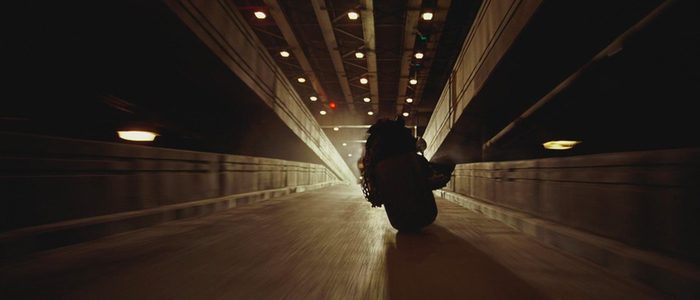
A Little Push
Despite these heavy themes, and despite the terror of Ledger's Joker, it's worth remembering that The Dark Knight is incredibly entertaining. And this is something the countless Dark Knight clones failed to pick-up on.After The Dark Knight became a mammoth hit, more and more "dark and gritty" superhero movies began clogging up the cinemas. "Grounded" became a buzzword for seemingly every comic book movie director. When it came time for Sony to reboot Spider-Man with The Amazing Spider-Man, seemingly everyone involved with that production cited Nolan's "grounded" approach.But for all the grounded elements, Nolan never forgets to entertain. The Dark Knight moves along at a steady, thrilling pace. Nolan stages scene after scene filled with thrills and action. The opening prologue, a Heat-inspired heist, is pulse-pounding while being morbidly hilarious. We watch as the Joker's hired-goons turn on each other, killing each other off one by one, seemingly unaware that this was the Joker's plan all along.Later, Nolan concocts a chase sequence loaded with danger and practical effects that puts most modern car-chase sequences to shame. It culminates in a cheer-inducing moment in which a real tractor trailer flips completely upside down in the center of a Chicago street. And even then, the moment isn't over. The Joker crawls out of the flipped truck and begins firing a machine gun wildly into traffic.The interrogation scene, in which Batman and the Joker are face to face for the first time, is a brilliant exercise in tension building. Batman starts the scene out completely in control, and then slowly the Joker turns the tables and takes command.Also helping matters is the cast. Say what you will about Bale's gruff bat-voice, the actor brings a serious dramatic heft to the character of Bruce Wayne and Batman. I think Bale's Wayne is a bit better than his Batman, but the entire package is worth celebrating. The weariness Bale brings to the part at the film's conclusion, after everything has gone down, is palpable.Eckhart is perhaps the unsung hero of the whole endeavor. Everyone talks about Ledger, and rightly so, but Eckhart's Harvey Dent is a rich, complex character, and the actor gives it his all. He hams it up ever-so-slightly when he goes into full Two-Face mode, but perhaps we can allow him that. Having half your face blown-off might make the best of us go slightly over-the-top.Gary Oldman's Jim Gordon is a beacon of light in a dark, dangerous film. He's also foolish. Gordon is too blinded by the thin blue line to realize members of his own division are corrupt, and it's heartbreaking to watch him try to make amends. "We have to save Harvey," he yells at the end, before changing it up instantly and adding: "I have to save Harvey!"Maggie Gyllenhaal is a better actress than Katie Holmes, and casting her to take Holmes place as Rachel Dawes is a step up. However, the character is painfully underwritten, and the fact that the script ultimately "fridges" her is unfortunate. That said, Gyllenhaal makes the most of what she has, bringing a cocky, funny air to the part that Holmes never possessed.Ultimately, though, it's The Dark Knight's moments, both little and big, that ultimately make it the classic it is today. The ways Nolan establishes Gotham as a real city, sprawling with real people; the situations where the Joker strolls into a scene and you can feel everyone holding their breath in his presence; the shot of Batman standing in the wreckage of a blown-up building, head down, defeated; the Joker escaping from custody in a police car, the car (and camera) swerving all over the road as the mad clown sticks his head out the window like a dog; the jaw-dropping IMAX shots of skylines; the Joker hilariously banging on his detonator after a bomb fails to go off. And, of course, the final moments of the film.In the end, the Joker wants nothing more than for Batman to kill him. If Batman were to kill him off, he'd finally be breaking his one rule, and the Joker would win. In one of the film's final moments, Batman hurls the Joker off a building, and rather than screaming in fear, the Joker laughs the whole way down. He's overjoyed at the thought of having won. But Batman won't give him the satisfaction."You just couldn't let me go, could you?" the Joker asks while dangling upside down, his long coat billowing around him. "This is what happens when an unstoppable force meets an immovable object. You truly are incorruptible, aren't you? You won't kill me out of some misplaced sense of self-righteousness. And I won't kill you because you're just too much fun. I think you and I are destined to do this forever." These are the final images of Ledger – hanging upside down, laughing maniacally, swaying dreamily in the night air. We leave him here, laughing, content. We want to stay just a little bit longer; we want the actor to remain with us. But it's not to be.The Dark Knight concludes with Batman deciding to be the hero Gotham needs him to be. That is to say, he agrees to take the fall for the crimes of Harvey "Two Face" Dent. In his madness, Dent had killed several people, and if Gotham discovered that, their spirit would break. And the Joker would ultimately win."Sometimes the truth isn't good enough," Batman says, "sometimes people deserve more. Sometimes people deserve to have their faith rewarded..."It's both a noble and troubling message. Is a lie worth it, if the lie is for the greater good? And who gets to decide what the greater good is? A man in a mask? This no doubt doesn't sit well with some people, and maybe it's not supposed to. Maybe The Dark Knight doesn't want to give the audience an easy conclusion. Instead, it wants to linger. To burn itself into the viewer's brain, and leave them asking questions. Batman speeds off into the light, a silent specter bathed in darkness. And we're left behind, wondering what comes next.
